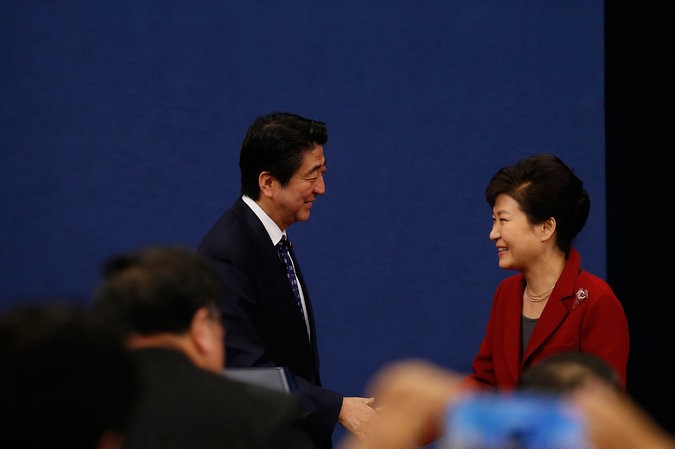(VOVworld) – Japan and South Korea reached a historic agreement on compensation for wartime sex slaves last December. The agreement, together with progresses in bilateral relations in 2015, promises a positive chapter in the Japan-South Korea relations in 2016.
 |
| Japanese Prime Minister Shinzo Abe and South Korean President Park Geun-hye after a joint news conference in Seoul, South Korea, in November (Credit Pool photo by Kim Hong-Ji) |
On December 28, 2015, Japan and South Korea reached an agreement over the issue of "comfort women," a term that describes sex slaves used by Japanese soldiers during World War II. Tokyo will give 1 billion yen, or about 8.3 million USD, to a South Korean government fund to help those who suffered. Japanese Foreign Minister Fumio Kishida said that Tokyo doesn't consider the 1 billion yen as compensation, but "a project to relieve emotional scars and provide healing for the victims”. A statement by Prime Minister Shinzo Abe and the Foreign Minister expresses their most sincere apologies and remorse to all the suffered women.
During World War II, about 200,000 Asian women, most of them Koreans, were forced to be sex slaves for Japanese soldiers. There are 46 surviving former Korean sex slaves, now in their 80s and 90s.
In 2015 Japan-South Korea relations progressed well. On the occasion of the 50th anniversary of diplomatic ties normalization on June 22, Japanese Prime Minister Shinzo Abe expressed his belief that the two countries’ cooperation in regional and global issues will lay a foundation for a better future. South Korean President Park Geun-hye said the 50th anniversary of the normalization of diplomatic ties between South Korea and Japan provided an opportunity for a turning point towards cooperation and a brighter future. Foreign Ministers of both countries agree to organize high-level dialogues and resume summits after many years of suspension.
Japan and South Korea have enhanced economic relations. They have prepared a ministerial meeting in Tokyo in the middle of this month to discuss economics, investment, trade, and private partnership.